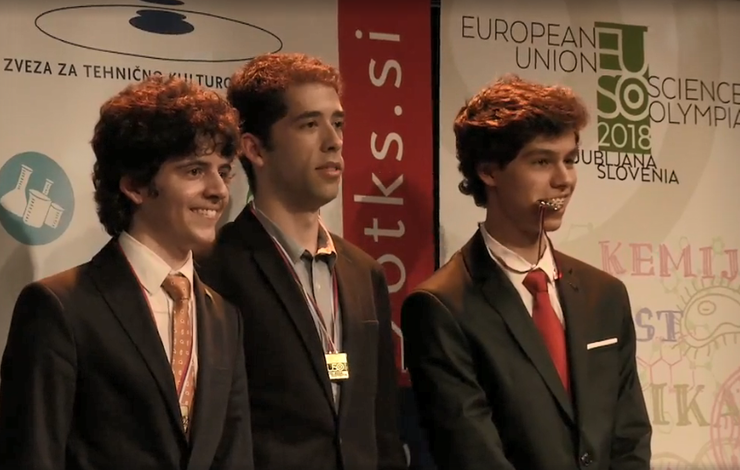16-04-2019

Portuguese students who represented Portugal at the 2018 European Union Science Olympics (EUSO) won a gold and a bronze medal. EUSO2018 was held in Ljubljana, Slovenia, and was attended by students from 25 different European countries. This competition, destined to students of secondary schools, in the age group of 16 years, and with special interest in the area of the sciences, tokk place from 28 of April to 5 of May and the ceremony of delivery of prizes on the 4 of May. The two Portuguese teams performed part of their preparation in the laboratories of the Departments of Chemistry, Physics and Life Sciences of the Faculty of Science and Technology of the NOVA University of Lisbon (FCT NOVA). The team of Armando Teixeira, Diogo Nogueira and Marco António Ribeiro won a gold medal and the team of Afonso Mesquita, Diogo Jacinto and Kevin Pucci won a bronze medal.
The Directorate-General for Education (DGE), the Portuguese Society of Physics, the Portuguese Society of Chemistry and the Order of Biologists ensured the organization of the Portuguese participation at EUSO. The scientific societies coordinate the mentors who prepare and accompany the students in the European competition. The DGE supports the costs of students and teachers in the selection, preparation of students and international participation, as well as organizes the logistics aspects.
In 2019, EUSO will run for the first time in Portugal, at FCT NOVA. The organizers of EUSO 2019 include DGE, FCT NOVA, the Almada City Council (CMA), the Portuguese Society of Physics, the Portuguese Society of Chemistry and the Order of Biologists. The preparation of the students for the competition will mainly take place in the laboratories of the Departments of Chemistry, Life Sciences and Physics of FCT NOVA.
This competition aims to stimulate the choice of scientific careers, to develop talents, to exchange experiences and contacts among students who may participate in the International Science Olympiads, as well as to compare the curriculum and perspectives of science education among the Member States of the European Union.
